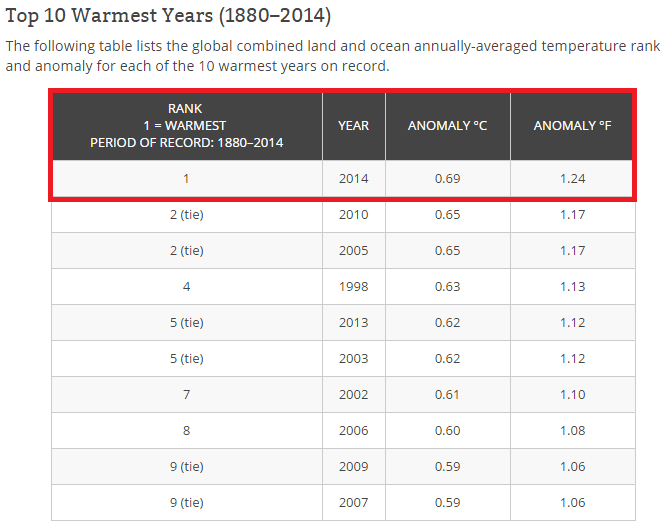2014 probably hottest year in 5,000 years

It's official.
Really official.
As I wrote last week, the National Oceanic and Atmospheric Administration and NASA officially announced Friday that 2014 was the warmest year on record globally since modern temperature records began in 1880.

Take a closer look at the top 10 warmest years above. 2014 is the third "new warmest year on record" in the past nine years, surpassing 2010 and 2005 as the previous warmest years globally. All of the 10 warmest year on record globally have occurred since 1998.
Create a More Connected Minnesota
MPR News is your trusted resource for the news you need. With your support, MPR News brings accessible, courageous journalism and authentic conversation to everyone - free of paywalls and barriers. Your gift makes a difference.

Here's a few key elements from NOAA's release on 2014.
Global Highlights
The year 2014 was the warmest year across global land and ocean surfaces since records began in 1880. The annually-averaged temperature was 0.69°C (1.24°F) above the 20th century average of 13.9°C (57.0°F), easily breaking the previous records of 2005 and 2010 by 0.04°C (0.07°F). This also marks the 38th consecutive year (since 1977) that the yearly global temperature was above average. Including 2014, 9 of the 10 warmest years in the 135-year period of record have occurred in the 21st century. 1998 currently ranks as the fourth warmest year on record.
This marks the third time in the 21st century a new record high annual temperature has been set or tied and also marks the 38th consecutive year (since 1977) that the annual temperature has been above the long-term average. To date, including 2014, 9 of the 10 warmest years on record have occured during the 21st century. 1998 currently ranks as the fourth warmest year on record.
This is the first time since 1990 the high temperature record was broken in the absence of El Niño conditions at any time during the year in the central and eastern equatorial Pacific Ocean, as indicated by NOAA's CPC Oceanic Niño Index. This phenomenon generally tends to increase global temperatures around the globe, yet conditions remained neutral in this region during the entire year and the globe reached record warmth despite this.
Six months of 2014 (May, June, August, September, October, and December) were record warm, while April was second warmest, January, March, and July were fourth warmest for their respective months, and November was seventh warmest.
Overall, the global annual temperature has increased at an average rate of 0.06°C (0.11°F) per decade since 1880 and at an average rate of 0.16°C (0.28°F) per decade since 1970.

Earth's unprecedented hot streak
2014 continues the trends of record setting heat since 1998.
It's astounding to climate watchers that 13 of the 15 warmest globally years have all occurred since the year 2000. The odds of that occurring naturally? One in 27 million. You are much more likely to be eaten by a shark.
Here's more perspective on just how 2014 fits into the bigger climate picture from NASA Senior Scientist Jim Tucker.
https://www.youtube.com/watch?v=jBOfp7bparw
Warmest in 5,000 years?
That 2014 was the warmest year since 1880 is remarkable. That it is probably the warmest year in 5,000 years is astounding. That's what atmospheric scientist Don Wubbles from the University of Illinois says about 2014 in this clip from a story in the Guardian.

“We can safely say it’s probably the warmest year in 1,700 and 2,000 years, and I think it’s probably safe to say 5,000 years,” said Don Wuebbles, an atmospheric scientist at the University of Illinois who has worked on a number of IPCC reports. “You have a continuous upward trend over the last century and that is telling us something. We have a clear signal that our climate changing, and when you look at the evidence it’s because of human activities.”
“The evidence is so strong I don’t know why we are arguing any more,” Wuebbles said. “It’s just crazy.”
For the record, there's no argument at Minnesota Public Radio. Our news editorial team takes the correct position that climate change science is robust and credible that there is no debate on the basic facts of climate change. Editorially we don't accept the argument that opposing views on the basic assumptions of climate science have any credible validity. That's called "false balance." Credible news organizations don't put people on the air who claim that smoking doesn't cause cancer in the face of overwhelming medical science that concludes it does.
The scientific consensus is clear: The earth is warming far beyond any conceivable natural variability and that human caused greenhouse gas emissions are changing earth's climate. Those changes are already having profound effects and impacts, and are likely to accelerate in the near future.
That's why I created Climate Cast at MPR News, our weekly broadcast on evolving climate science and earth changes with co-host Kerri Miller. We will continue to cover breaking climate news and the accelerating earth changes as we move through 2015.